- Home
- Margaret Pemberton
A Multitude of Sins
A Multitude of Sins Read online
Bello:
hidden talent rediscovered
Bello is a digital only imprint of Pan Macmillan, established to breathe life into previously published classic books.
At Bello we believe in the timeless power of the imagination, of good story, narrative and entertainment and we want to use digital technology to ensure that many more readers can enjoy these books into the future.
We publish in ebook and Print on Demand formats to bring these wonderful books to new audiences.
About Bello:
www.panmacmillan.com/bello
Sign up to our newsletter to hear about new releases events and competitions:
www.panmacmillan.com/bellonews
Contents
Margaret Pemberton
Dedication
Epigraph
Prologue
Chapter One
Chapter Two
Chapter Three
Chapter Four
Chapter Five
Chapter Six
Chapter Seven
Chapter Eight
Chapter Nine
Chapter Ten
Chapter Eleven
Chapter Twelve
Chapter Thirteen
Chapter Fourteen
Chapter Fifteen
Chapter Sixteen
Chapter Seventeen
Chapter Eighteen
Chapter Ninteen
Chapter Twenty
Chapter Twenty-One
Chapter Twenty-Two
Chapter Twenty-Three
Chapter Twenty-Four
Chapter Twenty-Five
Chapter Twenty-Six
Chapter Twenty-Seven
Chapter Twenty-Eight
Chapter Twenty-Nine
Chapter Thirty
Chapter Thirty-One
Chapter Thirty-Two
Epilogue
Margaret Pemberton
A Multitude of Sins
Margaret Pemberton
Margaret Pemberton is the bestselling author of over thirty novels in many different genres, some of which are contemporary in setting and some historical.
She has served as Chairman of the Romantic Novelists’ Association and has three times served as a committee member of the Crime Writers’Association. Born in Bradford, she is married to a Londoner, has five children and two dogs and lives in Whitstable, Kent. Apart from writing, her passions are tango, travel, English history and the English countryside.
Dedication
For Mike
Again, as always
Epigraph
Defeat cries aloud for explanations, whereas success, like
charity, covers a multitude of sins.
ADMIRAL MAHON
Prologue
The immaculately uniformed doorman, bearing the gold-crested insignia of the Victoria Hotel, Hong Kong, swung open the vast glass door leading on to the street and saluted respectfully. Elizabeth Harland gave a slight smile in acknowledgement of the service rendered and stepped out into the pale light of early morning. It was barely dawn. The noise and tumult, so inherently a part of Hong Kong’s street scene, were temporarily subdued. The city of Victoria was taking a brief rest, pausing before it launched itself into another frenetic, fevered, adrenalin-packed day.
The sleek, low-slung sports-car she had hired the previous evening had been brought round to the front of the hotel and was waiting for her. A bellboy opened the door for her, ascertained that she had everything she required, and sincerely wished her a good day. As she turned the key in the ignition, firing the engine into life, he stepped back, watching as she pulled away from the kerb, the same expression of admiration in his eyes as that still lingering in the eyes of the doorman.
Lee Yiu Piu was sixty-two years old and he had been a doorman for over twenty years. The Victoria Hotel was one of the most prestigious in the world, and Lee Yiu Piu knew class when he met it. Elizabeth Harland, tall and slender and graceful, her wheat-gold hair coiled into a thick knot at the nape of her neck, her white linen suit starkly simple, her only jewellery the ring she wore on her left hand and the small pearl studs in her ears, reeked of it.
‘Where can she be going at this time of the morning?’ the bellboy asked curiously as he stepped back into the hotel’s flower-filled lobby.
Lee Yiu Piu shrugged. He didn’t know. It was certainly strange, especially so if the rumours he had heard were true. An airport taxi throbbed to a halt beneath the porte-cochére, and a party of flight-weary newsmen and cameramen spilled out. Lee Yiu Piu stepped forward, opening the massive glass doors for them. Their conversation as they entered the hotel indicated that the rumours were true. In which case, the beautiful Englishwoman’s lonely dawn departure was even more puzzling.
Elizabeth’s hands shook slightly on the wheel as she turned into Chater Road and past huge hoardings announcing the televised concert that was to take place that evening. She had known her return to Hong Kong would be traumatic, but she hadn’t expected such a physical onslaught on her senses; such a searing sensation of having been whisked back in time, of never having left.
She had flown into Kai Tak Airport late the previous evening, the island a dark hump in the silk-black sea, glittering like a Christmas tree with a myriad twinkling lights. She had never approached it by air before and she had been grateful. It brought back no memories. No visions of the island as it had been on the sun-filled afternoon twelve years ago when she had first sighted it from the rails of the Orient Princess, its mountains soaring silver-grey, silver-tawny, silver-green, gashed by ravines and tortuous valleys, the lower slopes dense with vegetation and thick with flame trees and vines and deep-scented hibiscus. So long ago. Before the war. Before the Japanese. Before Raefe.
As she sped through the narrow gaudy streets the unmistakable, indefinable smell of Hong Kong assailed her, ripping wide the intervening years and sending them scattering. She was twenty-five again. Twenty-five and so deeply in love that the mere memory of it made her gasp for breath.
With her knuckles white on the wheel, she turned inland, skirting the Happy Valley Racecourse and zigzagging up the mountainous road that led to the Wong Nei Chung Gap, the centre of the island. Behind her were stupendous views of the city and the harbour and Kowloon; and in front of her, as she neared the Gap, were glimpses of the bays and rocky inlets of the island’s southern shore, milk-white beaches merging into an indigo sea. There was no other traffic, no other traveller in view. She drew to a halt, opening the car door and stepping out on to the roughly made road. Wong Nei Chung Gap. Peaceful, serene – and the scene of a bloody carnage that had left scores of men dead and countless others wounded.
A sparrow-hawk wheeled high above her head, disturbing the silence. No familiar landmarks remained. There was no sign of the Brigade Headquarters that had once nestled in a fold of the hills. No sign of the shelter that had been erected lower down, closer to the road. For Hong Kong, the war was over, forgotten. And for her? Her delicately featured face was sombre. Despite the huge hoardings that lined Chater Road, and despite the newspapermen already gathering, how could it ever be forgotten? How could she ever even wish to forget?
The sparrow-hawk, sighting prey, plummeted. She watched the large wings flutter against the scrub and rock, and then it soared high, wheeling into a ravine, a small unidentifiable mammal imprisoned in its talons. There was silence. In the distance, the sea shimmered, outlying islands insubstantial as shadows in the early morning heat. There was no one to be seen. On the most crowded island on earth she was, as she had wanted to be, alone.
She sat down on the grass, hugging her knees, knowing that before she returned to the teeming streets of Victoria the past would have to be faced and the most important decision o
f her life taken.
Chapter One
Snow fell steadily over the bowed heads of the mourners as they gathered at Serena Kingsley’s graveside. The autumn of 1924 had been chill and bleak; and now, in January, an Arctic frost showed no sign of giving London relief. As the familiar words of the Anglican burial service were read, more than one elegantly gloved hand surreptitiously lifted the cuff of a mink or vicuna coat to glance at a wristwatch and estimate how much longer it would be before the service was over and they could decently leave. There would be heart-warming French Cognac and a lavish buffet awaiting them at Jerome Kingsley’s Belgravia home, and a chance to indulge in the social gossip that was their meat and drink.
The mourners were fewer in number than they would have been if Serena had died at a more suitable time of the year. Winter, for the Kingsleys’friends and acquaintances, was a time of migration. They either sought refuge in the milder climate of the Riviera or sailed south to the more exotic retreat of Madeira. Apart from the Kingsleys’ only child, a daughter, there was no family present. Serena’s parents had died in a yachting tragedy many years previously, and Jerome Kingsley’s antecedents were a mystery. If he had a family, it was one he never acknowledged. He had appeared on the London scene in 1905, polished and assured, and the possessor of a talent for financial manipulation that amounted to near-wizardry. By the time he was thirty-two and had proposed marriage to Serena Hughendon, one of the most eligible heiresses of the season, he was able to be accepted with society doing little more than raise a delicate eyebrow. Self-made millionaires cannot, with impunity, be accused of fortune-hunting.
The marriage was a remarkably happy one. If Jerome Kingsley was unfaithful to Serena, he was so discreetly, and there were those of his friends who doubted if, in fact, he ever did more than indulge in a little light flirtation. He was forty-five now, a tall, powerfully built man with a strong assertive jawline, his massive shoulders hunched beneath his beaver-trimmed overcoat. He had loved her deeply and now, at thirty-two, she was dead.
‘Glory be to the Father, and to the Son, and to the Holy Ghost,’ the priest said concludingly.
The mourners breathed a sigh of relief and stamped their feet on the snow-covered ground with as much energy as good manners allowed. Jerome Kingsley released his daughter’s hand and stepped forward, staring long and silently down at the coffin. All her life Serena had hated the cold and the dark, and now he was leaving her here, alone. Tears blinded his eyes, and a muscle twitched convulsively at the corner of his jaw as he gently dropped a long-stemmed, perfectly formed white rose on to the coffin, and then a handful of the earth that was to cover her. Ashes to ashes, dust to dust. He didn’t believe in a resurrection. This was their final parting. And he would not try to replace her.
His daughter squeezed his hand comfortingly as he returned to her side; and then, heartbreakingly vulnerable in a black velvet coat with a black velvet tam-o’-shanter perched on top of her pale gold hair, she, too, stepped forward, a posy of winter violets clutched in her hand. ‘Bye, Mummy,’ she whispered, and with all the grace that had been so characteristic of Serena she let the delicate blossoms fall lightly on to the coffin deep at her feet.
Adam Harland swallowed, chasing away the lump in his throat. His friend’s ten-year-old daughter had always held a special place in his heart; and now, seeing her dignity at this most traumatic moment, he felt both pride and pity. She would miss Serena terribly. Jerome’s financial interests took him to many different parts of the world, and his frequent absences from home had forged a deep bond between his wife and his daughter. School would, no doubt, fill part of the void her mother’s death would leave. School and her music.
As they began to walk out of the cemetery towards the gates and the waiting Rolls-Royces, Hispano-Suizas and Lanchester Fortys, he wondered how much comfort her music would be to her. It had always played an important part in her life. He could remember calling in at Eaton Place before continuing with the Kingsleys to the opera or theatre and a chiffon-clad Serena trotting Elizabeth out of the nursery in order to sing and do her party piece for him. She could have been only two or three years old at the time and already she had had excellent intonation. It was a talent inherited from Serena, who had a great love and respect for music; not from Jerome, who was tone deaf, and who viewed his daughter’s musical talent with indulgent forbearance.
He paused at the door of his Austin Swallow, watching as the chauffeur opened the rear doors of Jerome’s Daimler and Elizabeth stepped inside. He could see her chin begin to wobble suspiciously and knew that once the Daimler drew away her tears would fall, fast and free. Jerome seated himself next to her, his strong-boned face white and pinched. He was a man unaccustomed to ill fortune. Adam wondered how he would come to terms with his loss.
He slid behind the wheel of his Austin, removing his black Homburg with relief and running his fingers through his thick shock of unruly hair. It had been Serena who had encouraged Elizabeth’s ear for music. There had been piano lessons as well as singing lessons. He followed the chauffeur-driven limousines away from the cemetery and down the Harrow Road back to West London, remembering his amusement at lifting her on to a piano stool when she was barely old enough to walk. By the time she was four she had learned to read music and had started to compose her own pieces. Serena had been thrilled, but he had always suspected that Jerome was less so. That he would have preferred his daughter’s precociousness to have taken a different form: one that he could more easily identify with.
He turned left, motoring with extreme care down Edgware Road and into Park Lane. The snow was beginning to settle, and driving conditions were hazardous. Several motor-cars had been abandoned, and only the stout-hearted were persevering with their journeys. A horse-drawn cart, undeterred by the weather, rattled in his wake, delivering ale to public houses. On his right a lone nanny determinedly pushed a perambulator across the icy fastness of Hyde Park.
He smiled to himself. He liked London. He liked the noise and the bustle. He liked the flower-sellers at Piccadilly Circus, their giant baskets at their feet, their cockney cheerfulness warming the greyest of days. He liked the unchanging stability of the gentlemen’s clubs in Pall Mall, lunching at Quaglino’s, driving down to Good-wood for the races. The war and all its hideousness was over, a slight limp his only legacy from the years of fighting. Life, for a bachelor of independent means, was good.
He skirted Palace Gardens, turning left for Eaton Place, narrowly avoiding a tramp carrying a board emblazoned with the words ‘HELP THE UNEMPLOYED‘. His mouth tightened. Life might be good for him, but it was hell on earth for the million and a half who were unemployed. Most of them were ex-soldiers. Men who had fought at Ypres and the Somme. Men who had expected a little more from victory than the misery of the breadline.
He skidded to a halt outside the imposing façade of the Kingsleys’ London home, wondering if the socialists really did have the answer to the age-old problem of poverty and if it wasn’t about time he became one. He grinned as he stepped out of his car. Jerome would have ten fits. ‘Bloody reds,’ he called them, shuddering with distaste whenever they were mentioned. Yet, as with most of Jerome’s pronouncements, Adam had a shrewd idea his words were more for effect than a reflection of his true feelings.
As he crossed the snow-covered pavement he saw that many of the chauffeur-driven vehicles had not yet arrived, their drivers being more cautious on the icy roads than he himself had been. The Kingsleys’ Daimler was there, and he wondered how Elizabeth would cope with the funeral-party that was to follow. In his experience, they were never sedate affairs. It was as if the shadow of death, touching uncomfortably close, had to be banished with loud laughter and determined gaiety.
The butler opened the door to him, wearing a suitable expression of sombre gravity. Adam suspected that it was not just a matter of appearance. Serena had been a considerate mistress, and her household staff had been with her since the early days of her marriage.
�
�Mr Kingsley is in the drawing-room, sir.’
Adam nodded, aware that more mourners were hard on his heels. There was already the sound of muted laughter, nervous tension seeking release in jocularity. He walked through into the long, wide, high-ceilinged room that Serena had insisted be decorated in cool tones of ivory and pearl grey. The only colour was in the bowls of flowers that graced the Adam fireplace, the exquisitely carved occasional tables, the two handsome Louis XV chests, magnificently inlaid and topped with marble. It was impossible to think of Serena in a room without flowers. Adam felt a catch in his throat. It was impossible to think of her as being dead.
‘Thank God you’re here,’ Jerome said, clasping his hand tightly. ‘The motions have to be gone through, but I’ll be damned glad when this charade is over.’
They had been friends for a long time. Jerome was fast-living, selfish, the possessor of deadly charm. Adam was quiet-spoken, reserved, with none of his flamboyance or charisma, yet the friendship was firm. When Adam had returned from the Western Front with a Military Cross for bravery in action, many of those who did not know him well had been surprised. Jerome had not been. He was well aware of the steely strength that lay beneath Adam’s unassuming manner. No matter how famous, how illustrious his other friends, it was to Adam that he turned in time of need.
‘What are you going to do when it is?’ Adam asked, aware that in another second Jerome would be surrounded by people offering sympathy and that all private conversation would be impossible.
‘Leave,’ said his friend tightly. ‘There’s no home for me in this house without Serena. Most of my business affairs are conducted from Paris or Geneva. I shall move into the Georges V for a few months.’
‘And Elizabeth?’ Adam asked, shocked. ‘She’s just lost her mother, Jerry. If you move to the Continent, she’s going to feel totally abandoned!’

 The Summer Queen
The Summer Queen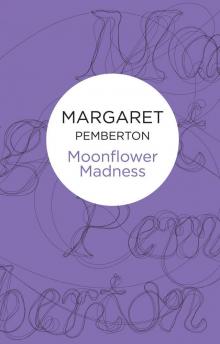 Moonflower Madness
Moonflower Madness The Londoners
The Londoners The Flower Garden
The Flower Garden Yorkshire Rose
Yorkshire Rose Vengeance in the Sun
Vengeance in the Sun Zadruga
Zadruga Beneath the Cypress Tree
Beneath the Cypress Tree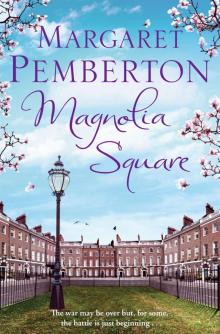 Magnolia Square
Magnolia Square Party in Peking
Party in Peking Lion of Languedoc
Lion of Languedoc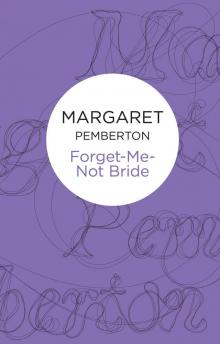 Forget-Me-Not Bride
Forget-Me-Not Bride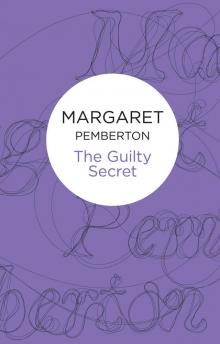 The Guilty Secret
The Guilty Secret Rendezvous With Danger
Rendezvous With Danger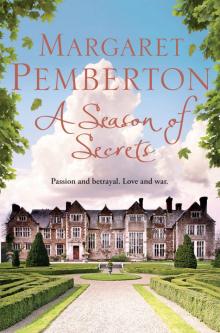 A Season of Secrets
A Season of Secrets Silver Shadows, Golden Dreams
Silver Shadows, Golden Dreams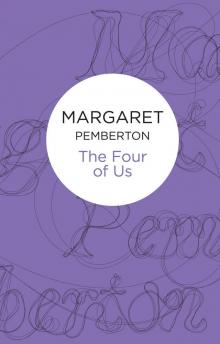 The Four of Us
The Four of Us Devil's Palace
Devil's Palace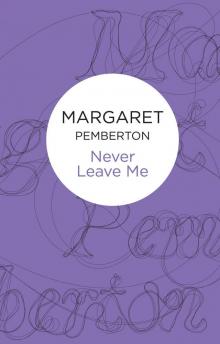 Never Leave Me
Never Leave Me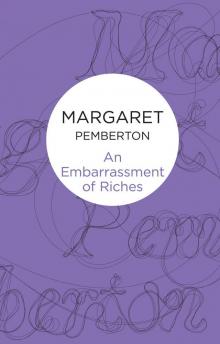 An Embarrassment of Riches
An Embarrassment of Riches African Enchantment
African Enchantment White Christmas in Saigon
White Christmas in Saigon Coronation Summer
Coronation Summer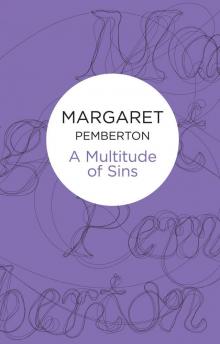 A Multitude of Sins
A Multitude of Sins Tapestry of Fear
Tapestry of Fear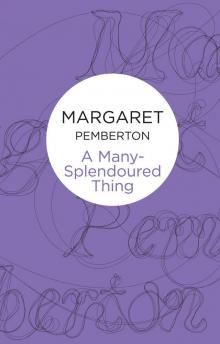 A Many-Splendoured Thing
A Many-Splendoured Thing